These are the students that were part of the 2017-2021 WheatCAP and did their master’s or Ph.D. thesis during this period.
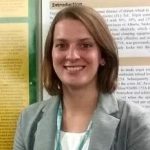
| Amanda Rose Peters North Dakota State University PhD in Genomics and Bioinformatics Email: amanda.r.peters@ndsu.edu |
I grew up in south central Minnesota in a farming community. Agriculture was a big part of my family life growing up. Through working at a Monsanto station for three summers in high school, I became interested in plant breeding and genetics. My passion for genetics grew while I earned an undergraduate degree in Biology at the University of Minnesota-Morris. I first began working with wheat during my Master’s program at NDSU under Dr. Justin Faris studying host-pathogen interactions. I am continuing my education under Dr. Faris for my PhD working on identifying, mapping, characterizing, and hopefully cloning a gene that underlies a yield component QTL. My career aspirations are to be either a research scientist in the public sector working for a government agency or at a state run university.

| Andrew Katz Colorado State University PhD candidate Email: andrew.katz@colostate.edu |
Hello, I am Andrew Katz. Growing up in the metropolitan area surrounding San Francisco, California, I developed a fascination with plant biotechnology. While studying plant genetics and breeding at Purdue University I gained a broader appreciation for the overarching principles of genetics. At the Department of Energy’s Joint Genome Institute, I was exposed to big science and learned the complexities of long-term goals with multinational research. In August 2017, I arrived at Colorado State University to begin as a PhD candidate characterizing and cloning a QTL on chromosome 6BL that affects grain width and thousand kernel weight in hard winter wheat. I hope to one day lead a breeding program as food security, value added varieties, and land stewardship are very important to me. I firmly believe that these ideals can be accomplished through crop improvement.
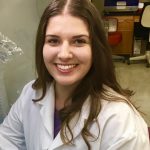
| Bliss Betzen Kansas State University MS Candidate in Genetics bmbetzen@ksu.edu |
My name is Bliss Betzen and I am pursuing a Master’s in Genetics under Dr. Eduard Akhunov at Kansas State University (KSU). I grew up in the small town of Parsons Kansas; this is also where my love of agricultural science grew as well. I followed this love by studying Agronomy: Plant Science and Biotechnology, Plant Pathology, and International Agriculture during my undergraduate at KSU. During my undergraduate I had the honor of working with Dr. John Fellers of the USDA-ARS on wheat leaf rust genetics and this furthered my interest in this field. Now I am heavily involved in Kansas Farm Bureau and the Kansas Science Communication Initiative at KSU where I actively promote women in STEM through telling my science story. I am investigating the co-evolution of wheat stem rust and corresponding resistance (R) genes. I study the limits of how the fungal avirulent (Avr) gene can change and continue to be recognized by its corresponding R gene. Specifically, I work with the Ug99 race group of wheat stem rust, which affects parts of Africa and the Middle East, and I focus on the AvrSr35-Sr35 pairing. Understanding the co-evolution of the Avr-R pathosystem and the R gene’s ability to recognize variants of Avr gene will lead to better understanding of the origin of new virulence specificities in wheat stem rust. I love the scope of my project because it ties together all of my interests and future career goals: genetics, plant pathology, and international agriculture.
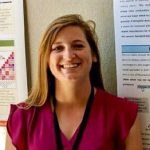
| Brittney Brewer Montana State University PhD Candidate Email: brittney.brewer@montana.edu |
My name is Brittney Brewer and I am a graduate student pursuing a PhD in plant science and plant genetics. I have the privilege of working in Dr. Luther Talbert’s spring wheat genetics lab at Montana State University. The path that has led me to pursue a career in plant breeding stems from a long-time interest and passion for agriculture. Having completed my BA in Crop Science, I have come to appreciate the complexity and pivotal importance of agriculture, particularly the resources that are afforded the farmer. It is this need for improved varieties that can successfully yield and compete in harsh and changing climates that led me to pursuing plant breeding. With these interest and funding from the WheatCAP grant my PhD project entails the validation, fine mapping and cloning of a QTL on 6B for reproductive tiller number. My primary goals as a plant breeder in response to a growing population and decreasing farm lands will be to develop varieties that are capable of meeting today’s challenges, such as drought tolerance, disease resistance, increased productivity and finding new approaches to improve yield.

| Chia-Cheng Kan Oklahoma State University PhD candidate Email: cc.kan@okstate.edu |
My hometown is Taipei, Taiwan. My strong research interest in staple crops improvement was built during my B.S. and M.S. study in Plant Pathology major. My work experience on rice at Academia Sinica further fortified this idea, which encouraged me to pursue PhD. study in winter wheat at Oklahoma State University. Oklahoma wheat variety-Duster shows superiority over another variety-Billings in several traits. My research project focuses on cloning the QYld.osu-1B gene in Duster x Billing population. Field trial of recombinant plants combining with the fine mapping of critical region would assist us to reach this goal. After graduation, and with my passion in translating research to real world application, I am planning to work as a molecular geneticist in crop breeding teams. In the long run, I would like to contribute myself in agriculture-related field in Taiwan.
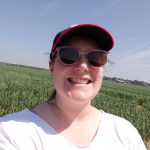
| Daniela Miller North Carolina State University PhD candidate Email: dmmille7@ncsu.edu |
Hi! I’m Daniela, and I was born and raised in Maryland, USA. I am interested in plant breeding and genetics because it is the alpha and omega of our food systems. Almost any agricultural issue can be addressed through breeding. Also, I just love being around plants.
Under the direction of Dr. Gina Brown-Guedira, my PhD work aims to characterize genetic control of glaucousness in US soft red winter wheat accessions, as well as exploring the use of long read sequencing to provide genomic information supporting breeding efforts. After I graduate, I plan to use genomics tools and long read sequencing to address issues of food security and food safety.
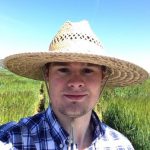
| Dylan Larkin University of Arkansas, Fayetteville Ph.D. Student Email: dllarkin@email.uark.edu |
I grew up in the rural farming community of Monroe, Oregon in the Willamette Valley. I then attended Oregon State University, Corvallis to earn a B.S. in Crop and Soil Science with a minor in Horticulture. I quickly discovered my passion for plant breeding after working for the barley and hazelnut breeding programs at the university. I then attended at Washington State University, Pullman, where I earned a M.S. in Crop Science with a specialization in Plant Genetics and Crop Breeding as a graduate research assistant with the USDA-ARS club wheat breeding program. I am currently a student at the University of Arkansas at Fayetteville working to earn my Ph.D. in Crop, Soil, and Environmental Sciences with a specialization in Plant Breeding and Genetics as a graduate research assistant with the wheat breeding program. I aspire to work as a plant breeder in the private or public sectors.
I will be working to characterize a QTL for grain yield, spike weight and thousand-kernel weight on chromosome 1A located between markers IWA2922 and IWA6707. This QTL was first identified in the bi-parental mapping population Pioneer brand 26R61 x AGS2000 (PA) evaluated in 12 environments and was confirmed in an association mapping panel including 240 soft red winter wheat (SRWW) genotypes in 8 environments. The QTL explains up to 10% of the variation in grain yield and 5% across 12 diverse environments. Lines carrying the AGS2000 allele showed on average 116.5 kg ha-1 higher grain yield than those carrying the P26R61 allele.
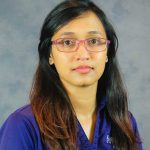
| Elina Adhikari Kansas State University PhD candidate Email: elina1@ksu.edu |
Education: My name is Elina Adhikari, I am from Nepal. I completed my B.S. in Agriculture degree from Institute of Agriculture and Animal Sciences, Tribhuvan University, Nepal in 2011. I got my M.S. degree from the Department of Plant Sciences, North Dakota State University in 2015. Currently, I am a Ph.D. student in Wheat Genetics Program under Department of Plant Pathology at Kansas State University.
Research focus: Wild relatives of wheat provide a rich system for investigating local adaptation, and a valuable source of new allelic diversity, of which only a small fraction was used for improving wheat’s adaptive potential. Prioritization of this allelic diversity for deployment in the breeding programs is critical for increasing their effectiveness and improving their ability to assemble allelic complexes in high-yielding varieties resistant to different climates. The main objective of my research is to improve the winter wheat germplasm for adaptation to extreme heat and drought. I am using genomic and eco-geographic information to perform genome-wide environmental scans and identify alleles associated with adaptive phenotypes based on their correlation with important climatic variables. These adaptive alleles will be introduce into breeding pipelines to develop new sets of adaptive germplasm that will be evaluated for heat and drought tolerance in the filed using high throughput phenotyping platforms.
Career goals: I look forward working in public and academic sectors.

| Ellie Taagen Cornell University PhD in Plant Breeding Email: PhD in Plant Breeding |
My name is Ellie (Ella) Taagen and I am pursuing a PhD in plant breeding at Cornell University under Dr. Mark Sorrells. I am originally from Seattle and attended the University of Washington for my undergraduate degree. I studied molecular, cellular, developmental biology and nutritional sciences and developed a fascination for the agricultural applications of these disciplines. I was introduced to plant breeding as an intern at The Bread Lab with Dr. Steve Jones of Washington State University and quickly fell in love with small grains. At the Bread Lab I also learned the importance of outreach and collaboration along a crop’s value chain. I am thrilled to be studying plant breeding at Cornell University and entering a career with opportunities to engage a range of stakeholders in agricultural production and food security.
Topics in plant breeding that I am particularly curious about studying are traits affecting yield and end-user preferences, and I continually find myself drawn to research with an international focus. I am passionate about aligning breeding goals with supply chain stakeholder’s values and facilitating access and adoption of improved varieties and enabling biotechnologies. The Wheat CAP presents an exciting opportunity to contribute to the further characterization and deployment of QTL for grain yield components in bread wheat. My research is focused on three QTL associated with grain weight and morphology on chromosomes 5A and 5B. Currently I am working with the wheat reference population synthetic W7984 x Opata M85.

| Jonathan Turkus Michigan State University PhD candidate Email: jodturkus@gmail.com |
Introduction: I am Jonathan Turkus, a graduate student in Michigan State University’s Plant Breeding, Genetics, and Biotechnology/Crop and Soil Science PhD program.
I became interested in plant genetics, breeding, and biotechnology through an innate interest in plants and inheritance, but also from a desire to use my knowledge of genetics to produce useful organisms for scientists and farmers, alike.
Primary Research Project: In Dr. Eric Olson’s Wheat Breeding Program, we work extensively with a population derived from a number of individual interspecific crosses between winter wheat and accessions of wheat’s D genome progenitor species, Aegliops tauschii. Within the D genome of these hybrids, the laboratory identified a number of quantitative trait loci (QTL) significantly associated with yield. Using individuals from this population displaying heterozygosity within these QTL, I am working to create groups of heterozygous inbred families (HIFs) for each QTL in order to fine map these regions.
The ultimate goal of this project will be to isolate and clone the specific genes embedded in the QTLs impacting this critical agronomic trait.
Long Term Goals: While I have an interest in entering the private sector as a breeder and/or biotechnologist, I realize the experiences ahead of me in the next four or five years may shift my ambitions toward an alternate career path in academic or government institutions. As such, I have not yet decided how to apply the skills and knowledge I will acquire while I pursue my doctorate.

| Jorge Valenzuela Antelo Texas A&M University PhD student jorgeluisva13@tamu.edu |
I am Jorge Valenzuela Antelo and am from Obregon, Mexico. I obtained my undergraduate degree at the Instituto Tecnologico de Sonora in biotechnology engineering and a master at the Colegio de Postgraduados-Montecillo in Genetics, where I collaborated with the National Institute of Forestry, Agriculture, and Livestock Research. I then joined the Bread Wheat Breeding Program at the International Maize and Wheat Improvement Center as a consultant. Since I grew up in a wheat growing area, I decided to pursue my career in wheat breeding and was inspired by Norman Borlaug legacy and the impact that the Green Revolution had in farmers’ lives as well as on food security.
Currently I am Ph.D. student in Plant Breeding at Texas A&M University under Dr. Amir Ibrahim and Dr. Shuyu Liu working on mapping traits adaptive to the U.S. Southern and Central Great Plains in a ‘TAM 204’/’Iba’ population as well as establishing protocols for gene editing using CRISPR/Cas9 in wheat. I will participate all of the training courses and workshops in Wheat CAP and involve some work on the 2B QTL cloning for yield and kernel weight.

| Jyotirmoy Halder South Dakota State University Ph.D. student Email: jyotirmoy.halder@sdstate.edu |
I am from Bangladesh, a small beautiful country located in South Asian where agriculture is the backbone of the country’s economy. My personal interest in plant breeding and genetics has been developed during my undergraduate study in Agriculture. I have always been interested in crop improvement and believe in taking the research from the lab bench into the farmer’s field and plant breeding essentially does it and makes a direct impact on agriculture economy. Furthermore, I strongly believe that plant breeding is very crucial for food security of billions of people globally.
Here in South Dakota State University, I am working in winter wheat breeding program under Dr. Sunish Sehgal. My research project will mainly focus on fine mapping and cloning a grain yield QTL from Aegilops tauschii transferred to hexaploid wheat. In addition, I will mobilize the QTL into several winter and spring backgrounds for utilization in breeding programs across the HRW region and the world. I have a passion for wheat breeding and genetics research and looking forward to building my career as a researcher. Moreover, as an agriculturist, I am completely aware of social responsibility and my utmost interest is to contribute to the sustainable food production effort for the world with growing population.
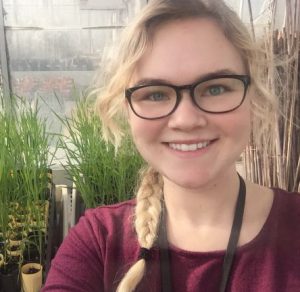
| Katherine Lauren Delaney Running North Dakota State University PhD in Genomics and Bioinformatics Email: katherine.running@ndsu.edu |
I grew up in Eau Claire, Wisconsin, but spent a lot of time on my aunt and uncle’s grain and cattle farm in Manitoba. Riding along in the combine and talking about wheat pathogens with my uncle was pivotal to my choice to study wheat genetics in my PhD. As an undergrad, I worked in Dr. Naden Krogan’s lab at American University in Washington, D.C. studying the transcriptional regulation of floral development in Arabidopsis. I now am working in Dr. Justin Faris’s lab on the molecular mapping and cloning of necrotrophic pathogen susceptibility genes in wheat. Additionally, I am conducting a yield component and seed morphology association study in the Global Durum Panel. Science education and outreach are important to me, so I plan plant science themed education activities for K-12 students each semester. I would like to be a researcher at a university or research institution.

| Katrina Johnson University of Idaho M.S. Candidate: Plant Science Email: john1653@vandals.uidaho.edu |
I am from Moscow, Idaho which sits in the Palouse region – a significant producer of dry-land wheat. It seemed a natural path to go into wheat production. My ultimate goal is land and resource conservation, achieved through yield increase. My focus will be grain number increase through the identification of genes contributing to spikelet numbers. I hope to take the knowledge gained in this program to allow me to be a part of other inter-disciplinary teams in pursuit of crop development.
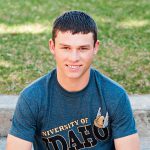
| Kyle Isham University of Idaho M.S. Candidate: Plant Science Email: Isha7549@vandals.uidaho.edu |
My name is Kyle Isham and I am from a small town in southern Idaho called Howe. I am currently starting my first semester of my master’s degree at the University of Idaho’s wheat breeding program at the universities extension center in Aberdeen, Idaho. I thoroughly enjoy working outside and seeing the improvements in the production side of agriculture. I also like the idea of improving the production of crops for the farmers around the United States. This is particularly important side for me because I come from a family farm, and I know how hard farming can be. On my family farm, we grow hard white spring wheat which is why I have passion to help improve the overall wheat production. My project is to increase the yield of wheat by increasing spikelet and tiller numbers. I will be trying to locate certain gene sequences on chromosomes and study them. With this experience I hope I can go to another breeding program and apply the knowledge I have learned with another crop, or become a crop consultant for farmers around Idaho.
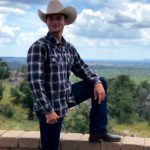
| Kyle Parker Texas A&M University Ph.D. Candidate Email: kxparker@tamu.edu |
I was born and raised in San Diego, California. My love of plants came from wanting to work outside. I Initially on a whim applied to UC Davis for Plant Sciences and immediately fell in love. Originally with a focus on horticulture, I got the opportunity to work in a tomato genetics lab on campus where I got to see plant breeding for the first time. After graduation from my undergraduate program, I worked for a season at HM Clause for a hot pepper breeding program. I got firsthand experience working in private industry and enjoyed the fast pace international environment where everyone was valued and contributed. After spending 6 months living out of a backpack abroad in the Pacific and South America, I knew it was time to return to the fields to further my education. I was looking to broaden my horizons from vegetable crops into agronomic crops and was luckily enough to be accepted into the wheat program at Texas A&M. My proposed work here will look at genomic selection/prediction across years as well as developing doubled haploid wheat plants with a focus on improving biotic stress resistances as well as yield and end use quality. After my PhD is completed, I hope to work as a plant breeder either internationally or domestically bettering crop plants for the changing world. There is something about knowing your work will be someone’s food one day that makes me want to do it forever.

| Max Fraser University of Minnesota PhD Candidate Email: frase093@umn.edu |
Max is entering his first year of graduate studies in Applied Plant Sciences at the University of Minnesota. Originally from southern Minnesota, he spent much of his childhood on his uncle and grandparent’s farms where he developed an interest in agriculture. Max was first introduced to the topic of plant breeding at a conference during his first year of undergraduate studies. It was there that he decided he wanted to pursue a career as a plant breeder as it seemed like an excellent combination of his aforementioned interest in agriculture and genetics. He was drawn to the complex issues of global food security and malnutrition, and is most interested in learning how to implement existing and emerging technologies to address these problems. Max’s career goal is to one day manage a breeding program at a land-grant university or abroad with an international organization.
Currently, Max is working with Dr. Jim Anderson and other members of the University of Minnesota team to categorize, fine map, and clone a kernel weight and width QTL residing of the long arm of chromosome 2A. Population development for fine mapping is underway and validation of the target QTL has begun.

| Meng Su University of Idaho PhD Candidate Email: su4011@vandals.uidaho.edu |
Hi, I’m Meng Su. I come from Shaanxi, China. I touched wheat breeding when I did my undergraduate project and also I did research about wheat quality in my Master study in China. It’s really interesting to do something about genetics and breeding, especially on wheat, because it has large genome and lots of mutants. In America, I continue doing wheat breeding research. Now, my project is QTL analysis on 5A which controls the spikelet number of wheat. It’s one of important traits for yield. After completing my graduate study, I want to be a researcher and to do research on genetics and molecular biology.
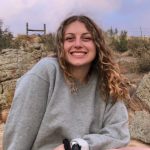
| Mikayla Hammers Colorado State University MS Student Email: Mik.Hammers@colostate.edu |
I grew up in Trumann, Arkansas, a small community in the Mississippi River Delta. Although I grew up in a farming community, I did not have interest in agriculture until many years after I left that setting. Going through school I became very passionate about genetics and food security. Through friends I made at the University of Arkansas food pantry, I found out I was able to combine these passions into work such as plant breeding. I immediately began contacting professors so I could learn more about the field. I was able to meet with Dr. Esten Mason and now work in his lab at Colorado State University.
My current research focuses around using imaging techniques to investigate the relationship of spike traits to area per spike and spikelets per spike. I will soon begin looking for marker-trait associations for these components and their relationships with yield. As of right now, I am not sure what I will be doing after graduation. I plan to continue doing research and have become exceptionally interested in how physiological processes in plants effect yield and yield traits. Ideally, I would love to focus on how the genetics components of physiological pathways could be used to develop more resource-efficient crops sustainable agricultural systems.

| Noah DeWitt North Carolina State University PhD candidate Email: noahddewitt@gmail.com |
My name is Noah DeWitt, and I’m pursuing a PhD in Crop Science at North Carolina State University with Dr. Gina Brown-Guedira. I’m originally from central Florida, and attended the University of Florida for my undergraduate, developing an interest in plant breeding and genetics working in citrus improvement. I’m interested in food security and think crop improvement is part of the solution to the challenges facing modern agriculture, including a changing climate. I’m excited about the collaborative aspects of this project, and hope to continue working in crop improvement as a career, preferably at a land-grant university.

| Peter Schmuker Washington State University PhD candidate Email: peter.schmuker@wsu.edu |
Hello, I am a graduate student in the spring wheat breeding program at WSU under Dr. Pumphrey. I am originally from Illinois where I obtained my undergraduate degree in Biology from UIUC. As an undergraduate I worked in a lab studying drought tolerance in bioenergy sorghum. It was during my research and coursework that I became interested in how plant genetics could be directly applied to food security and sustainability. This led me to starting down the career path of a breeder. My work at WSU centers on characterizing genetic sources of Hessian Fly resistance and utilization of genomic selection technologies. After graduate school, I hope to work as a breeder or research geneticist.

| Priscilla Glenn University of California-Davis PhD candidate Email: pdglenn@ucdavis.edu |
My name is Priscilla Glenn. I am a first year PhD student at the University of California at Davis (UCD) under Dr. Dubcovsky. I am from Pflugerville, Texas and chose to pursue plant breeding/horticulture due to an initial interest in genetics. When exploring deeper into genetics, plants caught my attention and have held it ever since. I am a member of the WheatCAP project at UCD which is characterizing at QTL for spikelet numbers on wheat chromosome arm 7AL. My personal project includes studying the determination of spikelet number in Triticale. My future career goal is to enter the plant breeding industry and pursue a career in crop improvement.
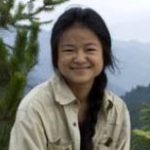
| Qianli Pan Kansas state university MS candidate Email: qlp@ksu.edu |
I received my bachelor’s degree in biology from China Agricultural University. Then I moved to Kansas, USA with my husband. I love bread and noodles, so no surprise that I was happy to join a wheat genetics and genomics lab. My current projects are focused on the CRISPR/Cas9-based wheat genome editing where we try to accelerate the pace of wheat improvement. I enjoy working in lab and greenhouse, and interacting and discussing projects with my lab mates. A dream future for me, will be joining an active and friendly crop research and breeding team, or pursuing a teaching career in academy.
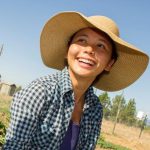
| Saarah Kuzay-Earl University of California Davis PhD candidate Email: snkuzay@ucdavis.edu |
I was born in Detroit, Michigan; and, spent most of my youth growing up in Santa Ana, California. I received my BS at UC Davis in Plant Sciences, emphasis in Genetics and Breeding, with a minor in Agricultural Entomology. Throughout my undergraduate career at UC Davis, I worked on variety of crops including strawberry, tomatoes, common bean, wheat, and peppers. I am currently a PhD student at UC Davis under Dr. Jorge Dubcovsky studying wheat genetics and plant breeding. The Dubcovsky lab is focused on genetics and breeding of small grains, namely pasta and bread wheat, barley, oats, and triticale. My research focuses on understanding the genetic basis of spikelets per spike (SPS) in wheat, a trait for yield in wheat. At present, we identified quantitative trait loci (QTL) for SPS on chromosome 7A and using positional cloning and TILLING (Targeting Induced Local Lesions in Genomes) mutants to identify candidate genes within the 7A QTL. After completing my graduate degree, I hope to work as a plant breeder for an institute, public university or in the Research and Development of the private sector. Ultimately, I hope to pursue a career path that will give me the freedom to continue researching and understanding the genetic basis of the traits we modify through plant breeding.

| Samuel Prather Washington State University PhD Candidate Email: samuel.prather@wsu.edu |
I first got my passion for agriculture during my teenage years while working for neighboring farmers in central Missouri. This led me to major in plant sciences at the University of Missouri for my undergraduate. Here I picked up a very strong interest in crop improvement. After graduating with a B.S. I when to Purdue University for a M.S. where I studied plant breeding and genetics. Given the incredible impact I see plant breeders can have I decided after my M.S. to continue my graduate education by coming Washington State University where I’m currently working on a PhD in breeding. My career goal is to use my skills in breeding and apply them in an industry setting to help create the best varieties possible. I’m currently working with Dr. Mike Pumphrey with WheatCAP funding to fine map QTLs influential to yield. Having identified a few genes of interest we are in the process of creating near-isogenic lines for the alleles of the genes in order to confirm their effect. Our hope is to find a few QTLs that can be easily selected for in our elite Pacific Northwest lines.
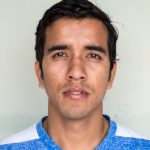
| Smit Dhakal Texas A&M University PhD candidate in Plant Breeding and Genetics Email: smit.dhakal@tamu.edu |
My inspiration to work in agriculture comes from farming family background in Nepal. After seeing multitude of rice varieties grown in farm field over the time drew me into plant breeding.
Currently I am working on a project on identifying underlining genes for the major QTL on chromosome arm 2BS, 2AS from the cross of CO 960293-2/TAM 111. QTL on 2BS is associated with yield, thousand kernel weight and harvest index. QTL on 2AS is associated with kernels per spike.
As a next-generation plant breeder and geneticist, I have an interest on accelerated breeding and release of more resilient wheat lines and varieties to break yield barriers in wheat. I will be looking forward to serve on public institutions on developing nations.
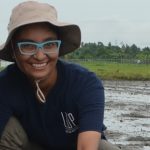
| Wardah Mustahsan Kansas State University Ph.D. candidate Email: wkm786@ksu.edu |
My name is Wardah Mustahsan and I am pursuing a PhD in Agronomy at Kansas State University. I am originally from New Orleans, Louisiana and obtained my undergraduate degree in Biology. During my undergrad I worked on various research projects related to plant physiology, cellular biology, and bioinformatics. My undergraduate research projects paved the way for my interest in agricultural sciences (plant breeding and agronomy). I continued my education at Texas A&M University pursuing a master’s in Plant Breeding focusing on transcriptomics analysis on heat tolerance in contrasting rice varieties. During this program I learned about the grave challenges present in food security, world hunger, and crop improvement. I am excited to continue my education towards a PhD in Agronomy at Kansas State University working with wheat. I would like to apply all my education to overcome the challenges present in the global agricultural industry, in particular with agricultural institutions whose focus is to aid global agricultural production in poverty-stricken countries around the world by establishing more versatile crop improvement programs.
The Wheat CAP program will provide an innovative opportunity to contribute to the further improve the characterization of QTLs related to yield components in wheat. My potential research will focus on cloning the yield QTL in chromosome 2DL identified in Great Plains hard winter wheat association mapping projects.

| Xiaoyu Zhang Oklahoma State University Ph.D. candidate Email: xy.zhang@okstate.edu |
I grew up in Jinan, China, and got my master degree in Institute of Genetics and Developmental Biology, Chinese Academy of Sciences. Now I am a Crop Science Ph.D. student in Oklahoma State University. In three years of field research experience in wheat, I’m proficient in lots of scientific instruments for plant physiology and climate change, and then two years of lab experience in wheat molecular genetics gives me a much deeper understanding of wheat. Now my research project focuses on cloning a major gene for spikelet number in common wheat. A total of 1,438 GBS markers were developed to genotype 186 F2 lines generated from a cross between CItr17600 and Yangmai18. A major QTL for spikelet number was found on the long arm of chromosome 7B, which has the LOD value of 13.75 and explained 35.4% of the total phenotypic variation. In the future, I want to join the faculty to begin a research career in wheat molecular breeding.

| Youngjun Mo University of California, Davis Ph.D. Email: yjmo@ucdavis.edu |
Mo Youngjun was born in Korea where he did a BA and MS at Seoul national University. He joined the Dubcovsky’s lab in March 2014 and finished his PhD in May 2018. He was initially supported by the T-CAP the first part of his project and by the WheatCAP the last two years. He studied the contributions of wheat plant height to adaptation a grain yield. He published three papers as part of his dissertation, which describe novel alleles that modify wheat plant height:
-
- Mo, Y., L.S. Vanzetti, I. Hale, E.J. Spagnolo, F. Guidobaldi, J. Al-Oboudi, N. Odle, S. Pearce, M. Helguera, J. Dubcovsky. 2018. Identification and characterization of Rht25, a locus on chromosome arm 6AS affecting wheat plant height, heading time, and spike development. Theor Appl Genet doi:10.1007/s00122-018-3130-6.
- Mo, Y., T. Howell, H. Vasquez-Gross, L.A. de Haro, J. Dubcovsky, S. Pearce. 2018. Mapping causal mutations by exome sequencing in a wheat TILLING population: a tall mutant case study. Mol. Genet. Genom. 293: 463-477.
- Mo, Y., S. Pearce, J. Dubcovsky. 2018. Phenotype and transcriptome characterization of a wheat tall mutant carrying an induced mutation in the C-terminal PFYRE motif of RHT-B1b. BMC Plant Biology. Submitted.
Current position: Research scientist at the Crop Breeding and Genetics division at NICS (National Institute of Crop Science) South Korea

| Yuzhou Xu Kansas State University Ph.D. candidate Email: yuzhouxu@k-state.edu |
My name is Yuzhou Xu. I am a PhD student in genetics program at Kansas State University now. My current research is focused on identifying resistant genes of Fusarium head blight in a wheat mutant. FHB is an important disease for wheat in US. I will use my knowledge on biotechnology and functional genomics to isolate the gene and transfer it to US wheat to make resistant varieties that can help farmers to increase wheat yield. Moreover, I will develop DNA markers for different disease resistance genes for application in wheat breeding. WheatCAP program give me great support. I have developed two F5:6 RIL populations and map-based cloning is under way now.

| Zachary James Winn University of Arkansas MS candidate Email: zjwinn@email.uark.edu |
Zachary James Winn is an Arkansas native from Springdale. After receiving his Bachelors of Arts Degree in Biology and Music from the University of Arkansas, Zachary returned to the U of A for his Masters in Crop, Soil, and Environmental Sciences. Having concern for the food security of future generations, Zachary chose his degree path to become a wheat breeder; through this he wishes to increase agricultural productivity and insure the sustainability of the human population. Zachary plans on pursuing higher education and ultimately continuing research in yield increasing genes.
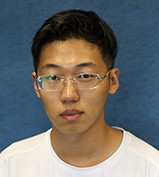
| Zhen Wang Texas A&M University Ph.D. candidate Email: wang1995@tamu.edu |
Hello, I’m Zhen Wang, a new Ph.D student working with professor Shuyu Liu at Texas A&M University. Wheat is an important crop all over the world, it can be used for making many different foods. My hometown ShanXi province is famous for its noodle culture, and there is also an important wheat growing region in China, so that’s why I prefer wheat as my research theme. I started work in wheat field from my bachelor’s thesis, it’s about wheat low nitrogen tolerance experiment. And during my Master’s phase in China Agriculture University, I conducted wheat yield gene mapping, which is a new research direction for me. I spent a lot of time in the field and the lab, worked with other students in our group, and made some progress in the yield gene mapping, and I found the real pleasure in my research thesis.
Now I’m working in a mapping population derived by TAM112 and Duster, mainly for greenbug resistant gene mapping. It’s challenging for me to analyze so much data and study specialized courses at the same time, but I believe joining the WheatCap project will be helpful for me to deal with all these pressures, and I will also share my experience in wheat gene-mapping. After I get my Ph.D degree, I want to be a researcher, and learn more about wheat genes